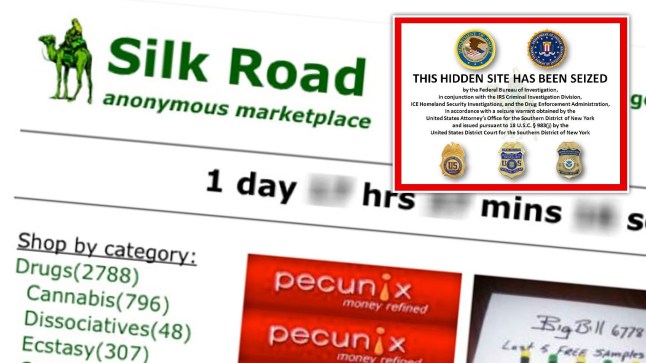
It started as a bold experiment – a Wild West style online marketplace where anything could be sold and no questions were asked.
But the Silk Road, one of the first and most notorious dark web markets, soon spiralled into a criminal empire worth millions, transforming its founder Ross Ulbricht into a ruthless cybercriminal known as the ‘Kingpin of the Dark Web’.
The Silk Road was only active for around three years, before Ulbricht was arrested by the FBI and jailed for life in 2015 having been charged with drug trafficking, money laundering and computer hacking. He was also accused of hiring a hitman to murder former employees, and was estimated to have overseen over $1 billion in illegal sales between 2011 and 2013.
But how did an unassuming entrepreneur and libertarian activist find himself becoming one of the 21st century’s most notorious drug lords? And why did Donald Trump offer him a full pardon just hours after becoming president?
This is the story of the Silk Road.
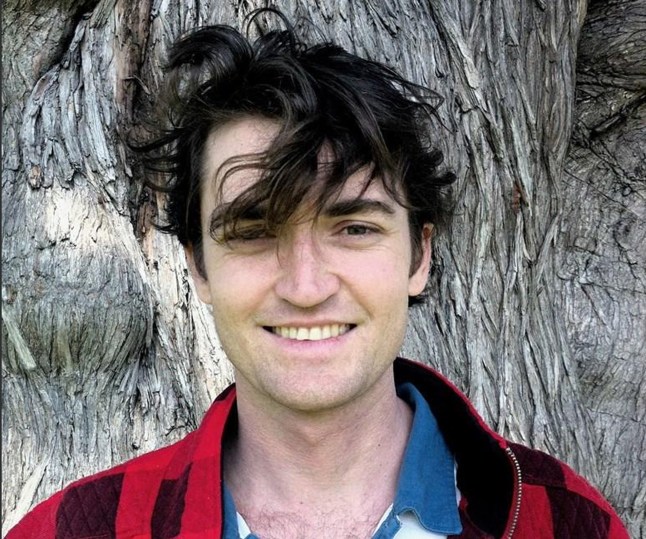
Humble Beginnings
Ross Ulbricht grew up in Austin, Texas, and had a reputation of being a smart, charming, but otherwise fairly normal person. A physics major who enjoyed surfing, hanging out with friends and occasionally smoking pot, he had a reputation as a bit of a ‘boy scout’ who was an unflinchingly honest and caring friend.
Having grown tired of the drudgery of lab research, Ulbricht changed tracks and sought to become an entrepreneur following a growing interest in economics, investing in several small businesses that went nowhere including a videogame company and a bookselling business.
Since college he’d been exploring psychedelics and reading Eastern philosophy, which inspired a growing libertarian streak. Ulbricht’s political views were that taxation and government were a form of coercion, and that the only way to be truly free was through economic independence. In 2009, Ulbricht wrote on his LinkedIn page that he wanted to ‘use economic theory as a means to abolish the use of coercion and aggression amongst mankind.’
His breakthrough came in 2010 with the advent of bitcoin and cryptocurrencies, which Ulbricht saw as a way to decouple commerce from government intervention and taxation. It was then a thought flashed through his mind, which he documented in his journal – ‘The idea was to create a website where people could buy anything anonymously, with no trail whatsoever that could lead back to them.’
And thus in February 2011, The Silk Road was born. One of the first marketplaces to take advantage of the Tor browser, which allowed users to browse the dark web with complete anonymity, his platform allowed people to buy whatever they wanted using bitcoins, which allowed for untraceable transactions to take place anywhere in the world.
Shortly before launching the website, Ulbricht wrote in his journal: ‘In 2011 I am creating a year of prosperity and power beyond what I have ever experienced before. Silk Road is going to become a phenomenon and at least one person will tell me about it, unknowing that I was its creator.’
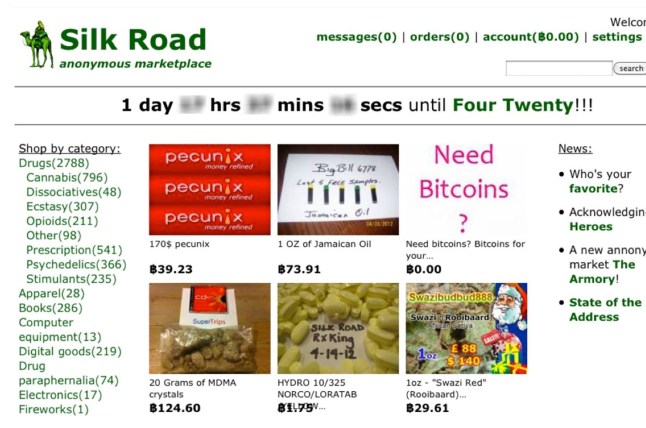
Dread Pirate Roberts is born
Like many libertarians, Ulbricht believed drug use was a personal choice, and The Silk Road was envisioned as a marketplace where users could buy and sell drugs in a professional, respectable environment.
The layout of the site mirrored other e-commerce giants such as eBay and Amazon, and offered users a similar experience – browsing was easy, and sellers had profiles, detailed listings and transaction reviews. With over 13,000 vendors operating on the site and its own escrow system ensuring transactions were legitimate, the site quickly became a paradise for drug connoisseurs.
No longer would drug deals be forced to take place in the backseats of cars or in seedy apartments; with the push of button buyers could now choose between Mexican and Colombian cocaine (stamped with a seal of approval), check reviews to see how strong their ecstasy pills were, and browse a seemingly unlimited variety of cannabis strains. Meanwhile, a series of community-driven blog posts instructed sellers how to effectively ship their product without getting detected, and offered instructional guides for users on how to safely consume their drugs.
Within a year of its launch, The Silk Road had become a phenomenon, with Ulbricht at the centre of it. Adopting the moniker of ‘Dread Pirate Roberts’, he used his newfound notoriety to preach his libertarian philosophy and became a cultlike figure amongst both the criminal underworld and libertarians alike.

His name, inspired by the 1987 film The Princess Bride, referred to a mythical pirate who inhabited the body of anyone who wore his mask; a fact not lost on his fans and followers who understood the symbolism of the handle and the mystery behind his identity. Some believed DPR, as he became known, had inherited the title from somebody else, while others speculated that the username was shared by a number of different people.
Yet despite his newfound notoriety, Ulbricht was struggling with the demands of his double-life and the need to keep his business secret from everyone around him. He spent the next few years living frugally, moving between a series of house shares and becoming increasingly withdrawn and secretive.
Despite presenting himself outwardly as a carefree, slightly bohemian ‘techbro’ not too dissimilar from many overachieving 20-somethings, behind-the-scenes Ulbricht was becoming increasingly consumed by his criminal alter-ego and the cultlike following behind him – and increasingly paranoid.
Breaking Bad
By mid-2012, Silk Road had established itself as the biggest innovation the drug trade had seen in decades, and for DPR and the community around him, it was about more than just trading contraband – it was a movement.
Ulbricht himself was also becoming steadily more arrogant and grandiose in his statements, declaring ‘Every single transaction is a victory in weakening the thieving, murderous state’ in a blog post and even agreeing to take part in a (heavily encrypted) interview in which he stated that The Silk Road was worth somewhere in the realm of ‘ten, maybe eleven figures’. Now a millionaire many times over, the Ulbricht and DPR personas were growing more polarised by the day.
Seeking an outlet for his DPR persona, Ulbricht struck up an online friendship with a mid-level cartel operator nicknamed ‘Nob’, who had once offered to buy The Silk Road during its nascent days. Although he declined the offer, DPR and Nob remained close, talking shop and sharing interests. The pair were careful to hide their true identities from eachother, but over time Nob became a trusted informant, and told Ulbricht if he ever needed some hired muscle he could seek him out.

But unbeknownst to Ulbricht, Nob had a double-life of his own – he was an undercover DEA agent named Carl Force who’d spent the past year masquerading as a Puerto Rican cartel enforcer named Eladio Guzman. And after watching Ulbricht’s moral collapse up close as his Dread Pirate alter-ego slowly took over, he one day logged on to a request which proved how much he had truly been consumed by his criminal lifestyle.
As the site had grown, Ulbricht made the decision to hire a number of employees to help run things. One of them was Curtis Green, a 47-year-old Mormon grandad who started using the Silk Road to deal with his chronic pain. Unlike his boss, Green wasn’t as savvy about protecting his online identity, and when he was captured by the DEA in a sting operation he began to spill his guts. Although he didn’t know DPR’s true identity, he was a major lead in the case, and was prepared to share everything he knew.
This sent DPR into crisis mode, and he scrambled to find a solution to the issue amongst his confidants. ‘This will be the first time I have had to call on my muscle,’ he told fellow employee Inigo. ‘Fucking sucks.’
Ulbricht contacted Nob and asked him how much it would cost to torture Green into silence. After some consideration, he later upgraded his offer to murder. A message sent from DPR to Nob said: ‘ok, so can you change the order to execute rather than torture?
‘He was on the inside for a while, and now that he’s been arrested, I’m afraid he’ll give up info.
‘Never killed a man or had one killed before, but it is the right move in this case,’ he added.
But unbeknownst to him, Green was sitting across the table from Force when he received the order to kill him, and together the two agreed to fake his death in order to throw him off the trail.

End of the road
While DPR thought the hit had secured the site’s secrecy, in reality law enforcement was rapidly closing in. In July 2013, two more Silk Road employees were arrested, and federal agents visited Ulbricht’s home in San Francisco after intercepting a shipment of fake IDs he ordered. Although they didn’t arrest him, he made a number of mistakes that allowed them to tie him to Silk Road, which he missed due to growing complacency and arrogance.
Some time later, Ulbricht used the pseudonym ‘altoid’ to post on a message board seeking replacement employees to help run the Silk Road. But in an act of hubris, he also used the same username to post a job ad on a bitcoin forum, and instructed applicants to contact him at rossulbricht@gmail.com.
Meanwhile, Ulbricht’s amateur self-taught code was struggling to scale to the demands of the Silk Road marketplace, which had grown to dominate the dark web, and after repeatedly refusing help from tech-savvy users to help clean it up, the server’s IP address eventually leaked. This lead was leapt upon by law enforcement agencies, who had finally found a way to catch the notorious Dread Pirate.
After tracing the server to its source and connecting it to Ulbricht, authorities were eventually able to gain access to the entire network, and spent weeks pouring over every single message sent from his account, including evidence he had hired Hell’s Angels to perform more assassinations on scammers and blackmailers.
The net was tightening, and Ulbricht was feeling the stress. While taking some time away from the site, authorities managed to install an electronic wiretap on his laptop that proved he and DPR were the same person.
Several associates encouraged Ulbricht to flee the country, including Nob, but he stayed in San Francisco, buoyed by hubris and a belief in his own intellect. Even as warning signs flashed all around him and law enforcement rapidly closed in, he still believed it was impossible to find him. He even told a potential employee ‘Realistically, the only way for them to prove anything would be for them to watch you log in and do your work.’
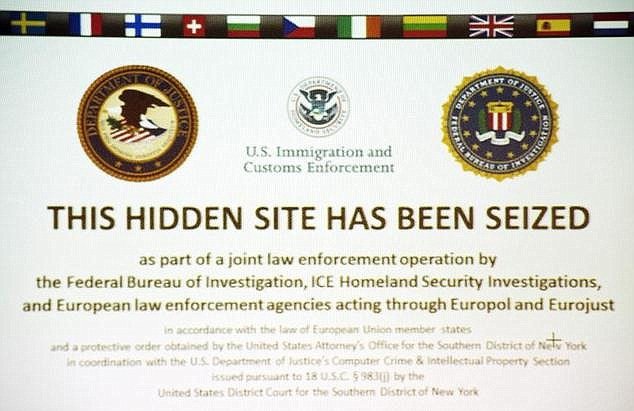
Over at the FBI, a warrant had been issued for Ulbricht’s arrest, and a SWAT team was on standby to storm his house at a moment’s notice. But fearful he may erase everything in a moment’s notice and leave them with nothing, agents instead sought to catch him in the act, ‘with his fingers on the keys’, so there could be no doubt that Ulbricht was the mastermind behind the Silk Web.
The day finally came on September 28 2014. Ulbricht had left his house and set up shop in the San Francisco library for the day, sat by a wall. Unbeknownst to him, he was surrounded by plainclothes FBI agents who had been given one simple message: ‘don’t let that computer close’.
At 3:14pm, a couple walked past Ulbricht, engaged in a heated argument. As their row intensified, the man grabbed the woman by the collar, who swore at him and attempted to hit him. Ulbricht looked up from his work, startled by the events, and in a split second the couple swooped on him, grabbing his phone and laptop in an instant before he had time to react. Ulbricht lunged for his machine, but it was quickly passed off to another FBI agent waiting nearby, and in the space of 10 seconds he was cuffed.
The machine was still open, and agents could see everything. Ulbricht was logged into the Silk Road server under as an administrator under an account called /Mastermind. In a cruel twist of fate, he had also been watching a segment on TV show Breaking Bad, about a mild-mannered chemistry teacher who becomes a druglord, which had aired its final episode a day before his capture.
FBI forensics soon found a mountain of evidence on Ulbricht’s computer: a list of all the Silk Road servers and the names Ross had purchased them under, 144,000 bitcoins (worth hundreds of millions), a spreadsheet of Silk Road’s accounting Ulbricht’s own personal diaries which his innermost thoughts as he worked through every step of his vast criminal conspiracy.
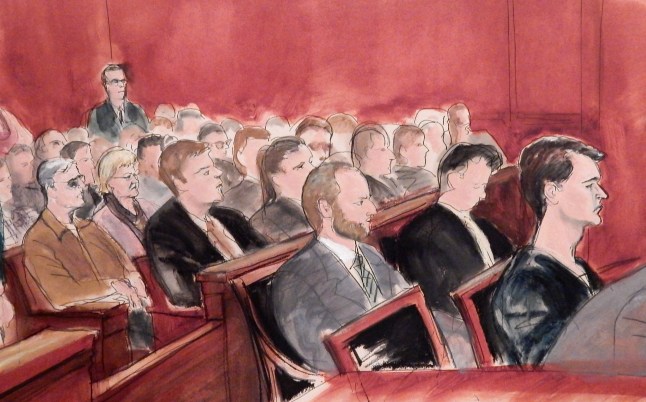
The Trial of Dread Pirate Roberts
Ulbricht’s trial was a media spectacle. Prosecutors framed him as a cold-blooded mastermind who not only facilitated drug deals but allegedly attempted to commission murders to protect his empire.
In 2015, he was convicted on charges including money laundering, computer hacking, and drug trafficking. Although he had attmepted to carry out several assassinations, there was no proof they had ever been carried out, and at least one- Curtis Green’s – had been set up as a sting.
The hammer fell hard: life in prison without parole. Critics called the sentence excessive, arguing Ulbricht was punished more harshly than many violent offenders. Supporters have since rallied around his case, and a ‘Free Ross Ulbricht’ movement’ has been a cornerstone of the US Libertarian party for years, who point to DPR as a visionary entrepreneur who was arrested due to government overreach.
But in an unlikely twist of fate, Ulbricht was granted a ‘full and unconditional’ pardon by Donald Trump just days after the former president returned to office, which he said a favour to Ulbricht’s mother ‘and the Libertarian Movement, which supported me so strongly’.

‘The scum that worked to convict him were some of the same lunatics who were involved in the modern day weaponization of government against me’, said Trump. ‘He was given two life sentences, plus 40 years. Ridiculous.’
Angela McArdle, the chair of the Libertarian National Committee, responded by saying: ‘Ross Ulbricht has been a libertarian political prisoner for more than a decade. I’m proud to say that saving his life has been one of our top priorities and that has finally paid off.’
Ulbricht’s lawyer, Joshua Dratel, said in an email he was ‘extremely gratified that an injustice has been corrected’, the Guardian reports. The pardon ensured that Ulbricht ‘can have a life ahead of him to be the productive person he could have been all these years’.
The former Dread Pirate Roberts is believed to be held in a federal facility in Arizona. It is not clear when exactly he will be released.
Get in touch with our news team by emailing us at webnews@metro.co.uk.
For more stories like this, check our news page.
MORE: The nation that proves drugs rooms work after dramatically reducing deaths
MORE: Diamond boss ‘chased thief down street’ after having £18,000 luggage stolen
MORE: Major twist in investigation over teenager Alex Batty who vanished for six years





